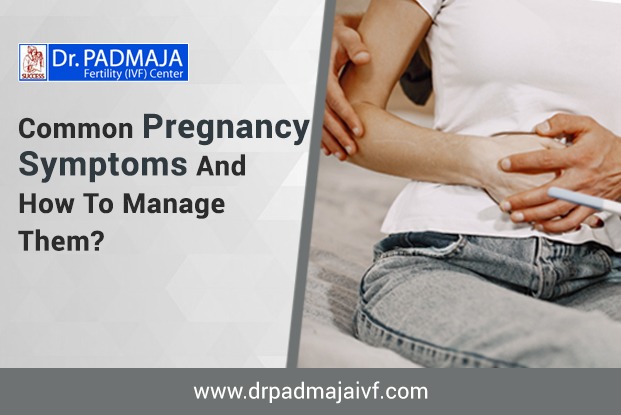Pregnancy is a wonderful adventure filled with excitement, joy, and, naturally, some difficulties. Every woman’s pregnancy experience is unique, but certain symptoms are quite common across all trimesters. From nausea to back pain, these symptoms are a natural part of the body’s adjustment to growing a baby.
Understanding these symptoms and knowing how to manage them can make your pregnancy more comfortable. Whether you’re in the early weeks or approaching your due date, being prepared helps reduce stress and keeps you focused on what truly matters—your health and your baby’s well-being.
This blog examines the most typical pregnancy symptoms and provides easy-to-follow advice on how to deal with them. If you’re planning to get pregnant or already expecting after receiving care from one of the fertility treatment centers in Hyderabad, this guide is especially for you.
1. Morning Sickness (Nausea and Vomiting)
What it is: Nausea, often called morning sickness, usually begins in the first trimester. It may be triggered by smells, foods, or occur without reason.
How to manage it:
Eat small meals throughout the day.
Avoid spicy, greasy, or overly sweet foods.
Keep crackers or dry snacks by your bed to nibble before getting up.
Ginger tea or vitamin B6 supplements may help (consult your doctor).
Morning sickness can be particularly worrying for women who conceived through IVF treatment in Hyderabad, but it’s a normal part of early pregnancy and usually fades after the first trimester.
2. Fatigue
What it is: It’s normal to feel worn out or exhausted, particularly throughout the first and third trimesters. Your body is exerting a lot of effort to sustain the developing kid.
How to manage it:
Prioritize rest and sleep.
Take short naps during the day.
Stay hydrated and eat a balanced diet.
Light exercise like walking can boost energy.
Women who’ve conceived with the help of Dr Padmaja IVF Center, known as one of the best IVF centers in Hyderabad, are often advised to balance rest with light activity to maintain circulation and stamina.
3. Frequent Urination
What it is: Due to hormonal changes and increased pressure on the bladder, you may find yourself needing to urinate more often.
How to manage it:
Don’t cut down on water—hydration is vital.
Avoid caffeine which can irritate the bladder.
Empty your bladder completely when you go.
For those undergoing treatment at infertility centres in Hyderabad, this is a well-discussed symptom that your doctors will help you navigate as part of your prenatal care plan.
4. Food Aversions and Cravings
What it is: Sudden changes in taste preferences can occur due to hormonal fluctuations.
How to manage it:
Try healthier alternatives to satisfy cravings.
Avoid non-food cravings (a condition called pica) and report them to your doctor.
Keep a food journal to track triggers and nutritional needs.
DrPadmaja infertility doctors, part of the expert team at the DrPadmaja Fertility Center, often recommend prenatal vitamins and balanced meals to ensure nutrition even when cravings get tricky.
5. Mood Swings
What it is: Hormonal shifts can affect neurotransmitters, leading to emotional ups and downs.
How to manage it:
Practice mindfulness, meditation, or prenatal yoga.
Talk to a counselor if emotions feel overwhelming.
Spend time with supportive friends and family.
If you conceived through IUI or IVF at iui centres in Hyderabad, emotional support is a critical part of your care plan, especially for first-time mothers.
6. Heartburn and Indigestion
What it is: As your baby grows, your stomach gets pushed up, causing acid reflux and discomfort.
How to manage it:
Eat smaller meals and chew slowly.
Avoid lying down immediately after eating.
Sleep with your head slightly elevated.
Patients from IVF centres like Dr Padmaja IVF Center are advised on diet modifications early in pregnancy to prevent or manage this symptom effectively.
7. Constipation
What it is: Hormones relax the intestines, making bowel movements slower.
How to manage it:
To get extra fiber, eat more fruits, vegetables, and whole grains.
Drink plenty of water.
Light exercise like walking helps digestion.
At fertility treatment centers in Hyderabad, dietary consultations are often included in prenatal care to help manage such issues without needing medications.
8. Back Pain and Body Aches
What it is: Your center of gravity changes as your uterus grows, causing stress on your joints and back.
How to manage it:
Use proper posture when standing or sitting.
Apply a warm compress or take warm showers.
Prenatal massages or physiotherapy can help.
Infertility doctors in Hyderabad, especially those at the best fertility centres like DrPadmaja Fertility Center, often provide guidance on safe physical activity and posture.
The Role of Fertility Clinics in Ongoing Pregnancy Care
While pregnancy symptoms are common, women who conceived through fertility support—such as IVF or IUI—may feel more anxious about what’s normal. That’s why choosing a clinic with ongoing support makes a difference.
The DrPadmaja IVF Center, widely recognized as the best IVF center in Hyderabad, offers continuous care from conception through the early weeks of pregnancy. Their team of experienced infertility doctors in Hyderabad understands the emotional and physical complexities of pregnancy after fertility treatment.
Additionally, their transparency around IVF cost, advanced technology, and high success rates make them a trusted name among fertility treatment centers in Hyderabad.
Final Thoughts
Pregnancy is a journey full of surprises—some delightful, some challenging. While symptoms like nausea, fatigue, and back pain are common, they can be managed effectively with the right lifestyle changes and medical guidance.
If you’re pregnant after fertility treatment or still planning your journey, staying connected with your care team is essential. Trustworthy infertility centres in Hyderabad, such as the DrPadmaja Fertility Center, not only help you conceive but also support you through every stage of pregnancy.
Your comfort, health, and happiness matter. With expert care, informed decisions, and a little patience, you can enjoy a smoother, more joyful pregnancy experience.
About the Author

This blog is penned by a devoted content specialist passionate about raising awareness around fertility treatments and emotional well- being. With in- depth disquisition on motifs like IVF and fertility, the thing is to give precious perceptivity for couples on their trip to parenthood.
Frequently Asked Questions (FAQs)
- What are the most common symptoms during early pregnancy?
Common early pregnancy symptoms include nausea (morning sickness), fatigue, sore breasts, frequent urination, food cravings or aversions, mood swings, and light spotting (implantation bleeding).
- How can I manage morning sickness?
Eat small, frequent meals, avoid greasy or spicy foods, and stay hydrated. Ginger tea or vitamin B6 supplements (with your doctor’s advice) can also help reduce nausea.
- Is cramping in early pregnancy normal?
Mild cramping can be normal due to uterine changes, but if it’s severe or accompanied by bleeding, contact your healthcare provider immediately.
- What helps with pregnancy-related fatigue?
Get plenty of rest, take short naps, stay hydrated, and eat iron-rich foods. Moderate exercise like walking can also boost energy levels.
- How do I deal with mood swings during pregnancy?
Practice stress-reducing techniques like prenatal yoga, meditation, or talking to a counselor. Hormonal changes cause mood swings, but emotional support is key.
- Why do I have to urinate so often during pregnancy?
Increased blood flow and hormone levels cause your kidneys to work more efficiently, leading to more frequent urination—especially in early and late pregnancy.
- Can I take medications for pregnancy symptoms?
Always consult your doctor before taking any over-the-counter or prescription medications during pregnancy. Some are safe, while others should be avoided.

